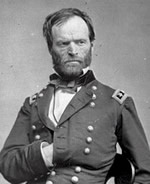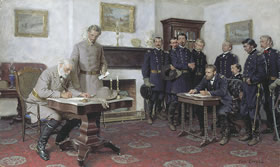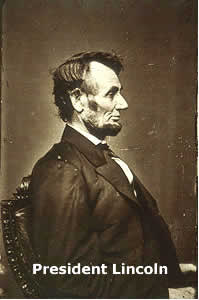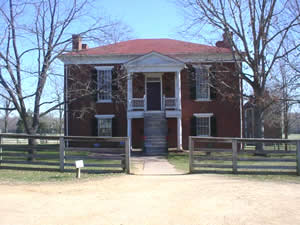The Final Years: 1864-1865
Copyright © 2007, Henry J. Sage
The Outlook at the End of 1863
As the third full year of fighting dawned, questions abounded. Grant had captured two Confederate armies numbering over 40,000 men. Lee's Army of Northern Virginia had suffered huge casualties, not only at Antietam and Gettysburg but also in their victorious engagements. If the outcome of the Civil War was inevitable, one might ask, how was the South able to carry on in the face of such losses? At the same time one might ask how the men of the Union, and their women at home, remained willing to accept such sacrifice in the face of an enemy that seemed determined to continue the slaughter at all costs.
In his classic history of the Army of the Potomac, historian Bruce Catton, discussing the reasons why thousands of veterans whose three-year enlistments had expired in the early 1864 were willing to sign up for further service wrote that, “the dominant motive, finally, seems to have been a simple desire to see the job through.” The same sort of motivation drove Confederates to continue the struggle in the face of difficult odds. Both sides had invested an enormous amount of blood and treasure in the conflict, and it was difficult to cast aside such a costly investment and give up the fight. So the fight went on.
President Lincoln, finally realizing that he had found a general who could finish what others had started, brought Grant east to take command of all the Union armies. Lincoln awarded him the rank of lieutenant general, the first officer since George Washington to have been given that honor. Although Grant was warmly received in Washington, he did not take well to the political environment of the city and quickly made his way to the Army of the Potomac headquarters where he conferred with General Meade, who officially remained the Army’s commanding general. Grant went back to Washington for conferences, but when he returned two weeks later, the Army of the Potomac was for all practical purposes now Grant’s army. Waiting to take the measure of their new opponent were Robert E. Lee and the Army of Northern Virginia. The war was about to enter its final stage.
As commander of all Union forces, Grant was now able to devise a strategy that would take advantage of the North’s superior numbers and the South’s dwindling resources. General William T. Sherman had taken over command of the Army of the Tennessee and was prepared to move into Georgia. Grant’s strategy was to have his Army of the Potomac capture Richmond while Sherman captured Atlanta, then the two armies would execute a pincer movement on Lee’s army in Virginia. Grant assigned additional missions to other officers, Generals Butler and Sigel, but the focus of the final year of fighting was on Grant and Sherman.
Sherman's Campaign in Georgia and the Carolinas, 1864-1865
On May 7, 1864, Sherman set out from Chattanooga with armies commanded by Generals Thomas, Schofield, and McPherson. Remembered for his famous march through Georgia, Sherman’s reputation suggests that he was cold-blooded and ruthless. In fact Sherman was a very skillful commander who did not spill blood, neither his or the enemy’s, carelessly. In his movement from Chattanooga to Atlanta, Sherman avoided direct attacks on heavily defended positions and instead used flanking movements to advance in a less costly manner. Sherman surrounded the city of Atlanta and accepted its surrender on September 2. He ordered the city evacuated, and in a famous letter to the mayor and city council, he gave his reasons why he would not honor their request to rescind the order. Realizing that his demand for evacuation of the citizens was harsh, he nevertheless promised to “make their exodus in any direction as easy and comfortable as possible.” His response is regarded as a clear definition of what modern total warfare had become. He was sympathetic but blunt in his purpose: “You cannot qualify war in harsher terms than I will. War is cruelty, and you cannot refine it; and those who brought war into our country deserve all the curses and maledictions a people can pour out.” See full letter.
 Sherman spent two months in Atlanta preparing for his “March to the Sea.” Keeping his promise to make Georgia howl, Sherman’s men cut a path across Georgia destroying everything of possible military value and much that was probably not. Although Sherman cautioned his men against unnecessary violence to civilians, the march was nonetheless harsh and brutal. Arriving outside Savannah shortly before Christmas, Sherman allowed a weak defending force to escape rather than fight what would surely be a losing battle.
Sherman spent two months in Atlanta preparing for his “March to the Sea.” Keeping his promise to make Georgia howl, Sherman’s men cut a path across Georgia destroying everything of possible military value and much that was probably not. Although Sherman cautioned his men against unnecessary violence to civilians, the march was nonetheless harsh and brutal. Arriving outside Savannah shortly before Christmas, Sherman allowed a weak defending force to escape rather than fight what would surely be a losing battle.
Sherman and his staff moved into the city, but the Army bivouacked outside and Savannah was left for the most part untouched. Several weeks later Sherman’s army crossed the Savannah River into the state which his men knew had been the source of all the rumpus, the first-to-secede state of South Carolina. Sherman’s march through Carolina was more fierce and brutal than his march through Georgia, but by that time Lee was in serious trouble in Virginia and was unable to help. Sherman captured the capital of Columbia in February 1865 and proceeded northward, planning to link up with Grant.
The Election of 1864. President Lincoln may have had reason to worry about being reelected, though his concern was less for his own political future than for the outcome of the war. He feared that if the Democrats won with their candidate, General McClellan,, the Confederacy might be allowed to go its way in peace with the union permanently severed. All the sacrifices made to that point would then have been for naught. Lincoln rejected suggestions that the election ought to be postponed or canceled on the grounds that he was fighting to save a democratic society, and denying people the vote would controvert the purpose for which he was fighting.
Lincoln did, however, decide not to run as a Republican but rather on a National Union Party ticket. (The Republican Party changed its name for the election.) He replaced Vice President Hannibal Hamlin with Andrew Johnson of Tennessee, a Southern Democratic senator who had remained loyal to the Union. Lincoln instructed that all soldiers who could be spared should be allowed to return home to cast their votes. Some states allowed their soldiers to cast their votes in the field. Those who were able to do so voted overwhelmingly for the president over the general who had formerly commanded many of them. The same sentiment that had propelled many soldiers to extend their service also worked for Lincoln—his fighting men wanted it to see the job done.
As late as August, 1864, the election may well have been in doubt, for Grant’s Virginia campaign was proving to be extremely costly. But Sherman's capture of Atlanta, a major southern city, in September gave renewed hope for a successful conclusion to the conflict to the northern people, and they reelected Lincoln by a comfortable margin. He won 55% of the popular vote and captured the electoral college by 212 to 21.
From the Wilderness to Appomattox Court House
About the time that Sherman was beginning his march into Georgia Grant attacked Lee west of Fredericksburg in the Battle of the Wilderness. The thick foliage caused confusion, and soldiers had difficulty distinguishing friend from enemy in the smoking undergrowth. After a few days of indecisive but bloody combat, the veteran Union troops expected to return to bivouacked once again and wait for the next assault. But Grant had other plans; he wired back to Washington that he intended “to fight it out on this line if it takes all summer.” Grant’s army engaged Lee in a series of frustrating and costly flanking movements that took the two armies from the Wilderness to Cold Harbor, a position east of Richmond. Grant's army suffered 60,000 casualties in one month, earning him the epithet of “butcher.” But Grant knew that he could eventually win the series of battles by grinding down Lee’s depleted forces with his own superior numbers and resources.
Grant directed to some of his subordinate commanders to advance on Petersburg, hoping to take the city and prevent Lee from using it as a base. The Federals failed to take Petersburg, however, in four days of fighting, and a nine month siege began. Lee’s army was now bottled up in Richmond and Petersburg, and Union attempts to breach the Confederate lines failed. The conclusion would have to wait for the spring of 1865.
Last-Ditch Diplomacy. While there can be little doubt that the initial cause of secession was slavery and that to a certain extent the war was being fought on that account, the three years of bitter fighting had shifted southern sentiments to a certain extent, and the goal of the Confederacy by late 1864 was getting out of the union at any cost. It was conceivable to many that that might even mean abandoning the institution of slavery. Although the idea of emancipating or arming the slaves alarmed many in the South, a number of officers and politicians thought the idea worthy of consideration.
In December 1864 Confederate Secretary of State Judah P. Benjamin and President Jefferson Davis authorized a mission to Great Britain and France with a proposition to offer abolition of slavery in return for recognition of Southern independence and assistance. Although the mission was unsuccessful, the potential value of freeing slaves to fight was powerful, and in February 1865 the Confederate House of Representatives authorized President Davis to enlist black soldiers from the southern states. Although Southern newspapers and politicians acknowledged that slavery had been a cause of the war, many argued that it was time to give it up in order to achieve independence. The movement came too late; by that time the Confederacy was lost.
In November and December 1864 Confederate armies under the command of General Hood moved into Tennessee in one last desperate offensive assault. The first action took place at Franklin, some 15 miles south of Nashville. The federals were forced to retreat, but Hood had suffered large heavy casualties. On December 15 and 16 General Thomas attacked the advancing Confederates and drove Hood’s men out of Tennessee all away to Mississippi. The last Confederate offensive action of the war ended in a crushing defeat.
On March 4, 1865, Abraham Lincoln was sworn in for his second term as president and gave a brief inaugural address. Considered by many his finest address, it is inscribed on one wall of the Lincoln Memorial in Washington. Acknowledging that slavery was the cause of the war, he said:
If we shall suppose that American slavery is one of those offenses which, in the providence of God, must needs come, but which, having continued through His appointed time, He now wills to remove, and that He gives to both North and South, this terrible war, as the woe due to those by whom the offense came, shall we discern therein any departure from those divine attributes which the believers in a living God always ascribe to Him? Fondly do we hope fervently do we pray that this mighty scourge of war may speedily pass away. Yet, if God wills that it continue, until all the wealth piled by the bondman's two hundred and fifty years of unrequited toil shall be stink, and until every drop of blood drawn with the lash, shall be paid by another drawn with the sword, as was said three thousand years ago, so still it must be said "the judgments of the Lord are true and righteous altogether.”
He ended on a conciliatory note, urging for the entire nation to bind up its wounds “With malice toward none; with charity, for all” to ensure a “just, and a lasting peace, among ourselves, and with all nations.”
See entire 2nd Inaugural Address
The Final Campaign. During the course of the winter, Grant’s Union army had been fighting their way around to the western side of Petersburg in order to cut off the last roads and the last railroad into the city. Although Sherman was rapidly approaching Lee’s rear, Grant was determined to finish the business himself. He sent cavalry under Philip Sheridan and the V Corps of the Army of the Potomac around to the west of Petersburg to attack Lee’s right. Lee's depleted Army could not stave off the Yankee assault as Grant ordered an advance all along the line.
 On a Sunday morning in April, while at St. Paul's Church in Richmond for services, President Davis received a telegram from General Lee indicating that the city must be abandoned. The Confederate government packed records and the treasury’s remaining gold on the last trains and headed out of the city. They set fire to everything of military value in Richmond, and with the departure of the army and the government, frustrated Southerners joined in the destruction of their capital. Union soldiers entered the city the next morning and their first business was to put out the fires and restore order.
On a Sunday morning in April, while at St. Paul's Church in Richmond for services, President Davis received a telegram from General Lee indicating that the city must be abandoned. The Confederate government packed records and the treasury’s remaining gold on the last trains and headed out of the city. They set fire to everything of military value in Richmond, and with the departure of the army and the government, frustrated Southerners joined in the destruction of their capital. Union soldiers entered the city the next morning and their first business was to put out the fires and restore order.
As Lee was attempting to escape to the West, President Lincoln visited Richmond, where he was surrounded by blacks shouting “Glory to God!” and “God bless Father Abraham!” Lincoln was overcome with emotion as he told one black man kneeling in front of him to get up again, that he did not have to kneel before anybody except God.
Lee’s desperate attempt to escape Grant’s army was doomed to failure. Now outnumbered by the Union army by about four to one, Lee’s famished men tried to reach a supply train near Danville, but they were cut off by Sheridan’s cavalry and the Union’s V Corps, whose 1st Brigade was commanded by Brigadier General Joshua Chamberlain. Two more corps were closing in on Lee. He reluctantly concluded that the only course left of him was to request a meeting with General Grant. On April 9 Lee formally surrendered the Army of Northern Virginia at Appomattox Courthouse. For all practical purposes, the Civil War was over. (For a moving account of the last days of the war and the surrender of Lee's army, see Joshua L. Chamberlain, The Passing of Armies: An Account of The Final Campaign of the Army of the Potomac, New York: Bantam, 1992. Major General Chamberlain accepted the surrender on behalf of General Grant. Chamberlain had been badly wounded at Cold Harbor, and his death was erroneously reported in Maine newspapers.)
President Lincoln Assassinated
 Feeling that his four-year nightmare had come to an end, President Lincoln was able to relax for the first time since his inauguration. On April 14 he and his wife attended a play at Ford’s Theatre in Washington. John Wilkes Booth, an actor who was familiar to the staff of the theater, made his way to the president’s box and shot him in the back of the head. Mortally wounded, Lincoln died the next morning, which was Good Friday. While many in the South were cheered by the death of the man they considered to be a tyrant, the North mourned its fallen leader. Thousands lined the tracks as Lincoln’s funeral train made its way back to Springfield, Illinois. As even some Southerners recognized, Abraham Lincoln would certainly have presided over a generous Reconstruction era, but that was not to be. As Winston Churchill wrote in his History of the English Speaking Peoples, the bullet that killed Lincoln did “more damage than all the Confederate cannonade put together.”
Feeling that his four-year nightmare had come to an end, President Lincoln was able to relax for the first time since his inauguration. On April 14 he and his wife attended a play at Ford’s Theatre in Washington. John Wilkes Booth, an actor who was familiar to the staff of the theater, made his way to the president’s box and shot him in the back of the head. Mortally wounded, Lincoln died the next morning, which was Good Friday. While many in the South were cheered by the death of the man they considered to be a tyrant, the North mourned its fallen leader. Thousands lined the tracks as Lincoln’s funeral train made its way back to Springfield, Illinois. As even some Southerners recognized, Abraham Lincoln would certainly have presided over a generous Reconstruction era, but that was not to be. As Winston Churchill wrote in his History of the English Speaking Peoples, the bullet that killed Lincoln did “more damage than all the Confederate cannonade put together.”
Within a few weeks after Lee’s surrender the remaining Confederate military units surrendered. President Jefferson Davis was captured in Georgia by a Union cavalry force that had traveled at will through the South. There were no settlements or negotiations; the Union had never recognized the independence of the Confederacy, so there was no need for any sort of treaty. The only issue was how to restore the former Confederate States of America to their proper place within the United States.
The impact of the terrible war on both the North and South was barely calculable. The fighting had produced approximately one million casualties, including over 600,000 deaths from all causes. The impact on the Southern economy had been devastating; shortages produced by the blockade and the printing of paper currency had led to drastic inflation in the Confederacy. The South also faced a badly deteriorating railroad network and shortages in labor, capital, and technology. Millions of dollars of value in property, including that of slaves, had simply evaporated, and the economic recovery of the South would be a struggle for both the black and white population for decades to come.
Women in the Civil War. As was true in the American Revolution, women on both sides assumed responsibilities that had once been the province of their departed husbands, fathers, sons and brothers. They managed farms, plantations and businesses, and in the North women took jobs in industry and government. Women were especially valuable in areas such as textiles and shoe making, helping to provide millions of articles needed by the soldiers. Many northern women enlisted in the Army Medical Corps, and the profession of nursing was advanced markedly through the efforts of women such as Clara Barton and Dorothea Dix. Florence Nightingale had become the British “angel of the battlefield” during the Crimean War, and her example spurred American nurses to carry their skills into areas formerly the sole province of men.
As has been true in other American wars, women were expected to do their part in keeping up the morale of the troops on the front line. Thousands of letters written from soldiers to their families, both north and south, as well as the families’ responses, have been collected and published. Historian James McPherson and others have done extensive research in collections of letters in order to better understand issues surrounding the war. Although difficult to measure, the impact of attitudes of the people at home certainly affected behavior on the battlefield. In the South, especially in the last year of the war, frustrations raised in places where Yankee armies had stormed through the country more or less unopposed were transmitted to soldiers directly; lonely and frightened women sometimes encouraged their husbands to desert and come home and take care of them.
An unknown number of women also fought in the Civil War on both sides. Since they had to disguise themselves and keep their sexual identity secret, records of female participation on the battlefield are virtually nonexistent. What information we have is mostly anecdotal, but it is nevertheless interesting. A woman who served with Grant at Vicksburg has become something of an icon for feminist historians. She fought as Private Albert D.J. Cashier, but had been born Jennie Hodgers in Ireland. She lived out her life as a man, and her true identity was discovered only when she was near death in an old soldiers’ home in Illinois.
Many women kept journals and diaries during the war, and those writing and the letters they wrote to soldiers and to friends tell us much about conditions in the North and South during the war. The last line of John Milton’s poem “On His Blindness,” is often cited to underscore roles of women in wartime: “They also serve who only stand and wait.”
Other Issues During the War
Financial Matters. Generally speaking the North handled wartime finances reasonably well, despite much corruption and waste. The Federal government raised taxes, sold bonds and printed “greenbacks”—paper money not backed by gold or silver that was supported by a “legal tender” act, meaning that the government paper currency had to be accepted for all debts public and private. The new taxes included the first federal income tax, higher tariffs, and taxes on almost every known commodity. The North did suffer a modest inflation during the course of the war, and widespread fraud occurred in the procurement of equipment, supplies and food for Union armies, a phenomenon that seems to recur in wartime with regularity. Yet except for a brief period of financial panic before Congress took action in 1861 in 1862, the federal economy remained remarkably stable.
In the South, because financial resources were depleted more rapidly than in the North, Confederate paper currency soon became devalued, and rampant inflation a hundred fold greater than in the north ruined the Southern economy and hampered the war effort. The South managed to procure much in the way of vital supplies through blockade runners, though owners of those ships often tried to maximize profits by smuggling in luxury items such as perfume along with gunpowder and rifles. At the end of the war, when Confederate money and bonds were invalidated, millions of dollars of paper worth evaporated.
Politics. The Copperhead movement in the North, mentioned above, threatened Lincoln’s management of the war and weakened the armies by encouraging men to desert. But the absence of a strong Democratic Party in Congress gave the Republicans an opportunity to pass legislation that might otherwise have stalled. The result was one of the most prolific periods of legislation in American history as the Republican pro-growth, pro-business Congress paved the way for postwar capitalist expansion.
Two laws passed in 1862 would have an enormous impact when the war ended by encouraging development of the West. The Homestead Act of May 1862 granted any family head over 21 years of age 160 acres of public land, the requirement being that the owner would have to live on the land for five years and develop it. Additional land could be obtained at very low prices. In order to improve transportation in those vast unsettled areas Congress passed a series of Pacific Railway acts beginning in 1862. The acts provided for huge land grants along proposed rights of way and loans for railroads which could be repaid at a comfortable interest rate. In the end railroad companies received over 200 million acres of land from both federal and state land grants, enabling construction of the first transcontinental railroad to continue as soon as the Civil War was over.
Another 1862 act, the Morrill Act, provided thousands of acres of land to the states for construction of colleges and universities for the furtherance of the agricultural and mechanical arts. At the same time Congress created the Department of Agriculture. The result of the Morrill act was the creation of many first-class universities across the nation, including some whose names, such as Texas A&M, reflected the purpose of the act. The impact of this significant legislation would, of course, not be realized until the fighting had ended, but the impact of these laws would carry well into the 20th century and beyond.
Jefferson Davis also faced political strife, but it played out differently for him than for Abraham Lincoln. With a vigorous two-party system still alive in the north, Lincoln was able to take criticism of his government and policies as traditional responses of the “loyal opposition” even when that opposition was not necessarily loyal. With the Southern one-party system, however, Davis tended to take criticism personally, and he was less skillful in absorbing the barbs than Lincoln, whose patience sometimes tried even his most loyal supporters. Davis was further hampered by the states rights philosophy of the South, which occasionally produced a sort of knee-jerk reaction to Confederate federal policies.
Wartime Diplomacy. For some historians it is almost a given that if Great Britain or France had recognized Confederate independence and entered the war, Southern victory would have been virtually assured. Lincoln was well aware of that fact when he apologized to the British over the Trent affair, recognizing that British involvement could only bode ill for the Union. Two factors worked in Lincoln’s favor regarding British involvement. Alternative sources of cotton in Egypt and India made British reliance on Southern cotton for her textiles factories less urgent. And British working class objection to Southern slavery gave pause to the government, especially following the Emancipation Proclamation, when British support for the South would seem to some like support for slavery.
The service of U.S. Ambassador to Great Britain Charles Francis Adams (son of John Quincy) cannot be overlooked. His skillful diplomacy kept his government well informed of possible British actions, and effectively neutralized potential conflicts that might have changed the British position vis-à-vis recognition of the South. The tension between the Lincoln government and the British came to a head in the summer of 1863 over the Laird Rams controversy.
James Bulloch was a Confederate agent and an experienced naval officer who made his way to Great Britain in 1861 and began to contract for the building of warships for use by the Confederacy. Two of those, the C.S.S. Alabama and C.S.S. Florida, became famous commerce raiders and did substantial damage to Union merchant shipping. When Bulloch negotiated with the Laird shipbuilding company for construction of a number of ironclad rams designed to break up the Union blockade fleet, Adams lodged repeated protests with the British foreign office. In one note he suggested to the British foreign secretary Russell, “It would be superfluous in me to point out to your Lordship that this is war.” The British government had already decided to back down, but the successful outcome of the confrontation nevertheless made Adams a hero. (Incidentally, James Bulloch’s sister, Martha (Mittie) Bulloch was Theodore Roosevelt’s mother.)
Despite some initial blundering, as when he suggested to President Lincoln that the United States might restore the Union by starting a foreign war (a suggestion which the wiser president simply ignored), William Seward proved to be an effective Secretary of State. When the government of Napoleon III began an imperial adventure in Mexico, the United States government refused to recognize his authority and sent troops to the Mexican border as a warning. Napoleon’s folly was soon undone as his appointed emperor of Mexico, Archduke Maximilian, was quickly deposed.
In the end, the hope for recognition of Southern Independence which might mirror French recognition of American independence in 1778 never came to be. Just as it can be claimed that had the French not intervened, the outcome of the American Revolution would likely have been very different, so it may be claimed that any such recognition on behalf of the Confederacy certainly might have changed the outcome of the Civil War. In that regard, the value of the service of Ambassador Adams cannot be overstated.
The Legacy of the War. The American Civil War, or war between the states, remains at the center of American history. The loss of over 600,000 lives and the destruction of untold millions of dollars in property was felt for generations. While the end of slavery was the most visible change on the face of America, numerous other transformations made the United States a very different nation in 1865 from what she had been in 1860.
On the negative side, the bitterness and hatred that would last for generations was an unsurprising outcome of the terrible conflict. In the North, smoldering resentment over the concept of the rich man’s war and the poor man’s fight would erupt in what became known as the war between capital and labor in the decades before 1900. Workingmen would prove to be just as willing to shoot a company hired guard or strike-breaker as they had been to shoot a rebel or a Yankee. Labor violence would continue well into the 20th century.
In the South, where the bitterness was understandably far greater than in the north, the former slave population was predictably scapegoated for the war and its outcome. Random violence against Freedmen began almost as soon as the war was over and continued with the rise of the Ku Klux Klan and other white supremacy organizations. The Civil War and its immediate aftermath, the Reconstruction Era, where huge milestones in the progress toward America's goal of “liberty and justice for all.” Nor was all the bitterness directed against blacks; whites who had openly opposed secession, or who had failed to support the Confederate cause with sufficient enthusiasm, were often targets of ostracism and even violence during the postwar years. In addition, northerners who came South after the war for various reasons, some of them good, were labeled “carpetbaggers” and were often abused.
A measure of the bitterness generated in the South can be seen in the words of a woman of Richmond, who wrote in her diary, “When the Yankees raised the American flag over the capitol, tears ran down my face, for I could remember a time when I loved that flag, and now I hated the very sight of it.” On hearing news of President Lincoln's assassination a woman in Texas exulted over the fact that the most bloodthirsty tyrant who ever walked the face of the earth was gone, and she hoped he would “burn in hell” all his days. A student of this author, a Northerner, once claimed that when she married a Southern man it took her twenty years to figure out that “damn Yankee” was two words. Recent struggles over the displaying of the Confederate flag and other racially motivated disturbances suggest that the legacy of the Civil War, though perhaps fading in the 21st century, is still alive.
Appomattox Court House |
Fords Theater, Washington DC |
Sunset at Gettysburg |
| Civil War Home | Civil War Introduction | Background 1850s | Civil War 1860-1862 |
| Decisive Year 1863 | Civil War 1864-1865 | Turning Points | Updated June 20, 2017 |


